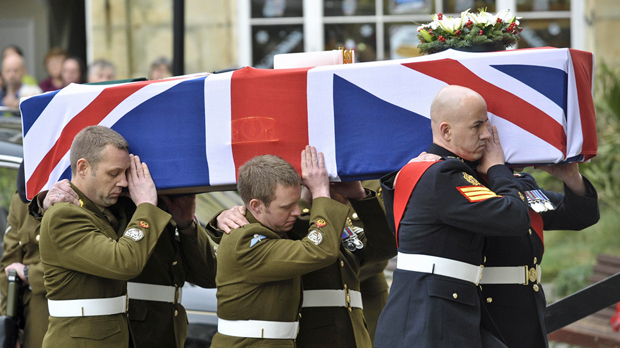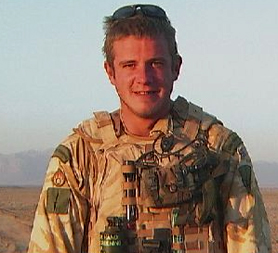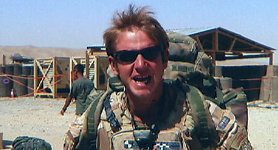Olaf Schmid death: do army inquests ever give us answers?
 Alex Thomson
Chief Correspondent
Alex Thomson
Chief Correspondent
Channel 4 News Chief Correspondent Alex Thomson asks if military inquests ever give families answers when – in the case of bomb disposal expert Olaf Schmid – some evidence is “never really explored”.

The key issue with inquests is that so often the families of the bereaved expect and hope that they will add up to something greater than the sum of their parts. By which I mean, they are simply set up as who, what, where, when and how inquiries into someone coming to untimely death. So above all else it is not about blame. Something coroners in my experience really do try hard to get across both before and during inquests – but it somehow often gets lost in the mix.
But whilst a coroner does not make a finding of criminal or civil liability, if that becomes a matter for the courts later, the coroner’s judgment will have an effect on whether a medical negligence compensation claim or similar case could be pursued.
Had the army received a Rule 43 they would be required to explain what action they were taking to stop any such deaths in the future.
The verdicts of cause of death available to a coroner include natural causes, accident/misadventure, a narrative verdict, neglect contributed to the death or unlawful killing. It is within the context of neglect that criticisms of health services and clinical negligence have arisen.
And then we come to Rule 43. The all-important Rule 43.
Channel 4 News special report – Afghanistan: taking on the Taliban

Between July 2008 and March 2009, 207 Rule 43 reports were made in England and Wales, of which the majority, 31 per cent (78), were sent to NHS hospitals and trusts.
If a coroner feels that evidence gives rise to a risk of other deaths in the same circumstances coming down the line, he or she can issue a Rule 43 ruling. This is sent to the organisation which has responsibility for the circumstances – in this case that would be the British army. If you receive a Rule 43 from a coroner, you have the curious term of 56 days to issue a formal written response.
Olaf Schmid: did ‘tiredness’ kill Afghanistan bomb expert?
But the coroner can only act upon evidence heard of course. In this case, critically, evidence concerning “cumulative tiredness” could have contributed to Olaf Schmid’s death, according to the MoD If it were a factor for SSgt Schmid then it could be for any bomb disposal expert in similar circumstances in Afghanistan. But this evidence was never really explored at the inquest.
Had the army received a Rule 43 they would be required to explain what action they were taking to stop any such deaths in the future – or at least reduce their likelihood. And if the army proposed to take no action at all, it would also have to explain that too.
Very, very occasionally it is possible in law to hold a second inquest. The chances of that happening would depend upon major shortcomings in any held inquest, or the sudden appearance of significant new evidence not heard at the original inquiry.
Right now the Attorney-General Minister Dominic Grieve, is deciding whether or not to hold – in effect – a second inquest into the death of the government scientist Dr David Kelly.
Read more – Olaf Schmid was ‘unlawfully killed’

Hitherto the government has argued that the Hutton Inquiry stood as an inquest – in law – into the death. Campaigners point to the shortcomings of the Hutton Inquiry and say major aspects of evidence have since come to light and the government must consider holding a full inquest.
But this evidence was never really explored at the inquest.
That decision is likely to happen in the spring. But the holding of an actual second inquest or in this case, what the Government would say would be in effect a second inquest, is, in truth, exceptionally rare.
As ever at inquest, much rests upon the shoulders of the coroner himself. Famously Felix Pizzarello, the Gibraltar coroner, allowed an inquest in 1988 into the deaths of three Provisional IRA members in Gibraltar, to become a major inquiry into whether or not the British government was operating a murder squad shooting unarmed civilians. Such actions and interpretation of the powers open to a coroner are rare.
-
Latest news
-
Taylor Swift’s new break-up album breaks records3m

-
NHS trust fined £200K for failings that led to death of two mental health patients3m

-
Sunak vows to end UK ‘sick note culture’ with benefit reform3m

-
‘Loose talk about using nuclear weapons is irresponsible and unacceptable’, says head of UN’s nuclear watchdog3m

-
‘There wasn’t an Israeli attack on Iran,’ says former adviser to Iran’s nuclear negotiations team7m

-




